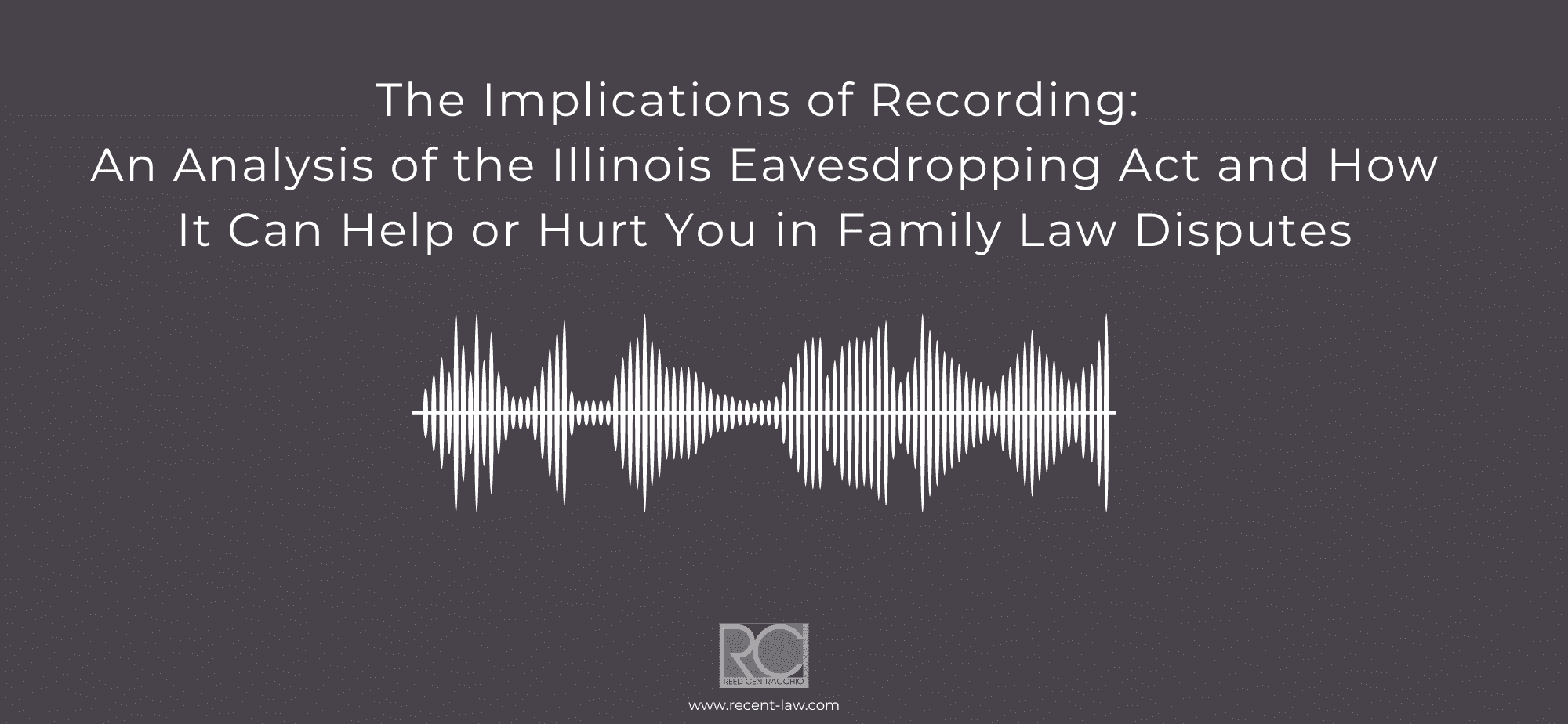You know you want to. The temptation is there. You’re getting ready to file for divorce, or maybe you’re already in the middle of contentious litigation. Your spouse or significant other is yelling at you again, threatening to take everything you have, promising that they will expose you for all that you are. Your cell phone is in your pocket. Your spouse or significant other stands across from you in the kitchen as they continue to scream and tells your children they will never see you again. Your attorney needs this. The Court should hear this. All you have to do is slide your hand into your pocket and press the record button. Nobody has to know. It would be so easy. Think again.
In Illinois, it is a criminal offense (i.e. illegal) to record a private conversation between yourself and another person without their knowledge and consent. A private conversation is defined as a communication between two or more people in which the parties to the aforesaid conversation have a “reasonable expectation” that the discussion will remain private. Whether a communication is private or not is a subjective determination, and in the absence of the Illinois legislature’s willingness to define what constitutes a “reasonable expectation of privacy”, it is often times up to the Judge in your case to determine, on a case-by-case basis, whether the parties involved in said conversations had a “reasonable expectation” of privacy. However, it is commonly recognized that one has a reasonable expectation of privacy in their home or in items that they own, such as a vehicle. In the alternative, one does not have a reasonable expectation of privacy in a public setting.
A private conversation is recorded in violation of the Illinois Eavesdropping Act when it is obtained through an eavesdropping device. An eavesdropping device is defined as “any device capable of being used to hear or record oral conversation or intercept or transcribe electronic communications, whether such conversation or electronic communication is conducted in person, via telephone, or any other means.” 720 ILCS 5/14-1(a). In other words, you cannot use your cell phone, computer, or any other electronic device to record your conversation with your spouse or significant other in your home or vehicle, unless they are aware that you are recording them, and they give you permission to do so. Why you ask? Because your spouse or significant other has a reasonable expectation of privacy in the home that you share. Specifically, it is reasonable for them to believe and expect that their verbal exchange with you is not being recorded and will not be overheard by other individuals.
If you do have audio recordings of your spouse or significant other that you obtained surreptitiously (i.e. procured through stealth or deception, or executed through secrecy or concealment), then not only could you be subject to a Class 4 felony (if a first time offender), but you may also be barred from conducting further eavesdropping, and may be required to pay punitive and/or actual damages to the offended party. Furthermore, any audio recordings illegally obtained are not admissible as evidence in court. There are of course exceptions to this general rule against audio recordings. Specifically, you are allowed to audio record your spouse and/or significant other if they are in the process of committing a crime, such as domestic violence and/or driving while under the influence. If your spouse or significant other is in the process of committing a crime, then you may take audio recordings of them without running afoul of the Illinois Eavesdropping Act and said recordings can be admitted as evidence in court. Another exception is when you obtain recordings of your spouse or significant other in the curtilage of your home (e.g. in the yard, on the front porch, etc.).
It is important to note that audio recordings obtained with the other party’s knowledge and consent are not violations of the Illinois Eavesdropping Act. Consent exists when someone’s behavior manifests acquiescence and/or they overtly acknowledge that they are being recorded and do not object. For example, a voicemail left by a spouse or significant other is an admissible audio recording that does not contravene the Illinois Eavesdropping Act and can be used by your attorney in court if relevant to the facts of your case.
Notwithstanding, it is legal to silently record video of your spouse and/or significant other. How can this be? As set forth in the criminal case of People v. Harris, a video recording, without audio, is not obtained through an eavesdropping device, and therefore, a silent video recording is not a violation of the Illinois Eavesdropping Act. 2022 IL App (3d) 190504-B. These silent video recordings can be admitted into evidence and used to support your case against your spouse or significant other. However, you cannot silently record your spouse or significant other if they are in the bathroom or changing their clothes, as these are examples of situations in which they still maintain a reasonable expectation of privacy, even in their own home.
What if Your Electronic Home Monitoring System Records Audio and Video?
Can you use audio recordings of your spouse or significant other obtained through electronic home monitoring systems that they knew were installed inside the house and which they were aware were recording them? The courts have not yet ruled on whether audio recordings obtained through electronic home surveillance systems that are installed with both spouses’ consent inside the home are illegal and/or inadmissible. However, this is an interesting fact-pattern that will likely be explored by the Illinois legal system as home monitoring systems become more commonplace and more discussions and/or arguments between parties to a divorce or parentage case are recorded.
In sum, and while the temptation is strong, do not attempt to record your spouse or significant other without first considering the consequences and discussing with legal counsel. Always consult with your attorney about any questions that you may have and when in doubt, resist the urge – you will thank yourself later.
The statements included in this blog are not intended to be legal advice. Please consult with and discuss with your attorney about all questions you may have about your particular case.


